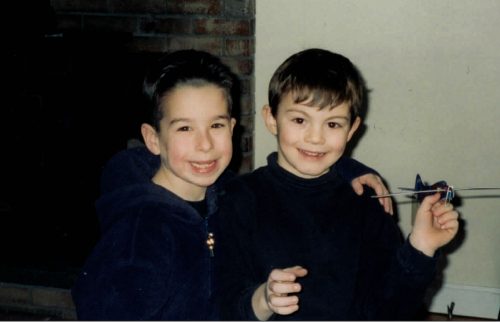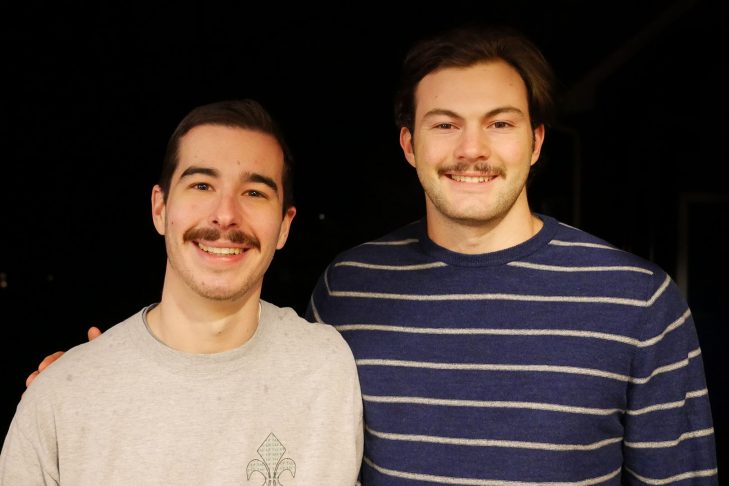Sam Hearne, 24, struggled with anxiety since childhood. As an architecture student at Tulane University in New Orleans, depression crept into his life. He confided in a best friend on campus, Daniel, who was also coping with mental illness. But, in September of their sophomore year, Daniel took his own life. Hearne knew he needed help. He took a medical leave from Tulane. And with his childhood best friend Jake Fishman, he set out to support other men who struggle in silence.
The pair launched Men’s Health Arkive this month as a social platform for men to learn about mental illness, read research from top doctors, share experiences and get support for a problem that men often find difficult to talk about. Nine percent of men experience anxiety or depression on a daily basis, but only one in four will speak to a mental health professional about it, according to the American Psychological Association. In fact, male suicide is the seventh-leading cause of death for males.
“There’s a stigma,” says Hearne. “It’s about admitting weakness and admitting needing help, which isn’t something men like to do at any age. It begins early. Men don’t care much about their health, and it’s a flaw. This [mental illness] is a reality.”
Related
“They told me, ‘You’d be dealing with this on your own.’ It blew my mind. I wouldn’t have made it five or 10 years,'” he says.
But Hearne knew that he didn’t want to end up like his friend.
“I was far worse before Daniel took his life,” he recalls. “The moment I got the call, I felt an overwhelming sense of release from depression and anxiety. I got out of myself for a moment. It was no longer my problem. It was, ‘What can we do to move forward?'”
Hearne took a medical leave from school, but it was an uphill climb: Hearne saw firsthand how difficult it is to navigate the maze of insurance, available and compatible therapists, and proper diagnoses. This is doubly hard when you’re sick.
Over time, Hearne became something of an authority on mental health for other friends dealing with similar issues.
Meanwhile, “I saw friends coming to me with the same issues. I was very open. I was in a fraternity at Tulane, and I had friends later in life come to me and say, ‘Hey, I didn’t understand what you were going through, but I have my own spell of depression, and I never knew it was so hard. Can you help me? I need some navigation.’ I was beginning to understand that the tools to most men seeking help aren’t there,” he says.

Sam Hearne, left, and Jake Fishman in 2001 (Courtesy photo)
He opened up to his longtime best friend, Fishman, a minor league baseball player for the Toronto Blue Jays, who grew up down the street from him in Sharon. He was home during the off-season and eager to help his friend.
“I’ve been friends with Sam since I can remember, and I’ve seen what depression can do to people, not just to Sam,” he says.
For Hearne, having a confidante was a key part of healing, and he encourages other men to seek out a trusted friend for conversation and support if they’re not yet ready for therapy.
“Find at least one friend who you can really sit down with and say, ‘This is where I am, and this might be the help I need.’ Let someone know your situation and your thought process and allow someone else to take in your information and your viewpoint and give you some feedback. It’s an outside perspective to tell you, ‘Hey, you need to look at this differently, here’s something you can try, there’s someone in your corner,'” he says.
Fishman isn’t a trained therapist, of course, but he is a conditioned athlete, and he was able to offer his friend concrete tips about proper nutrition and sleep.
Men’s Health Arkive will serve that purpose, too. Anyone can post about their experiences in a public archive; a “credentialed” archive will serve as a clearinghouse for doctors and research professionals. Hearne has approached experts at top Boston mental health centers like McLean Hospital to share their wisdom on the site.
“We want to give men a general understanding of what is ahead of them but the comfort of [knowing] that it’s not impossible. Millions of men are dealing with the exact same thing at the exact same time. As bad as it got for me, I always told myself, ‘You can find a worse story.’ It only makes you feel so good, but it’s true: I can afford mental health care. My parents had a car, so I could get to appointments. I could take off school.”
Not everyone has those advantages, but hopefully Men’s Health Arkive will jumpstart the healing process for some. As for Hearne, he feels as though he’s on a slow road to recovery.
“It’s taken years. I’m not cured by any stretch. I have tough days, but I am better than I’ve ever been, and I’m on an upward trajectory and have been for the past year,” he says.




